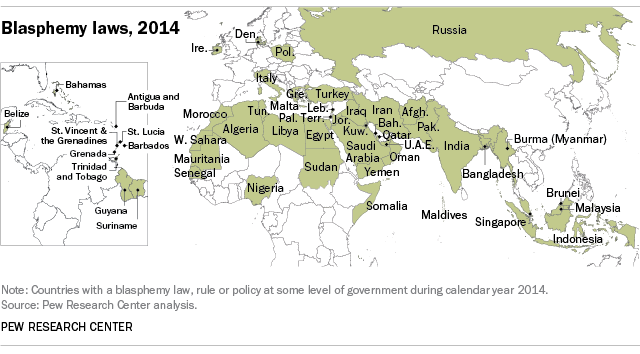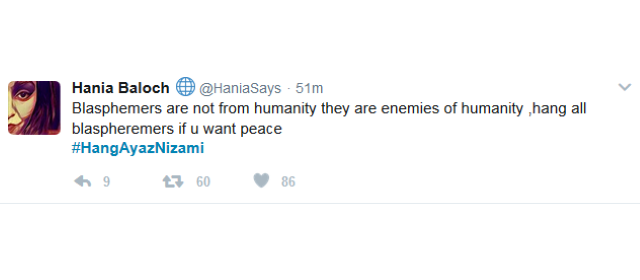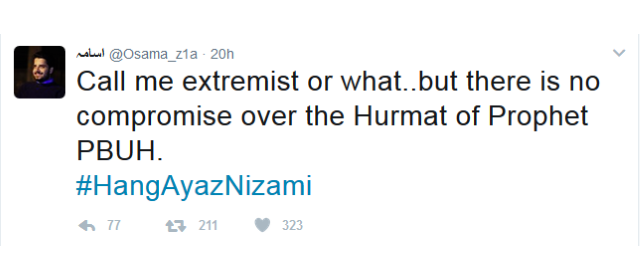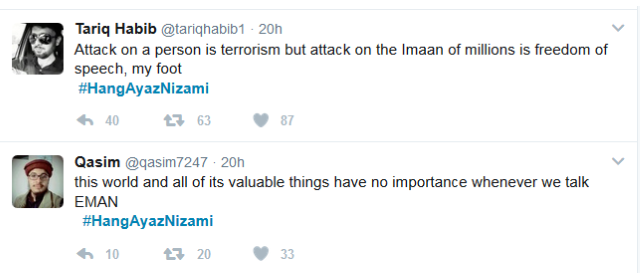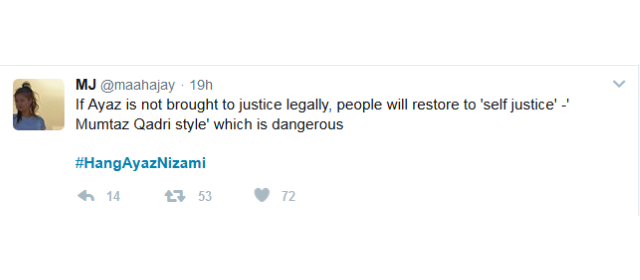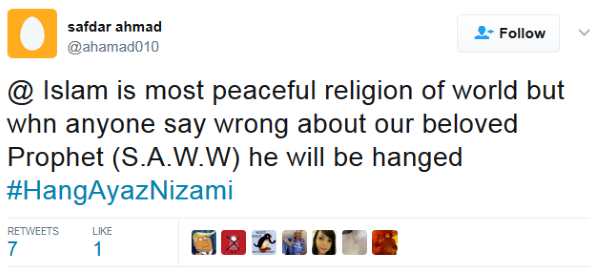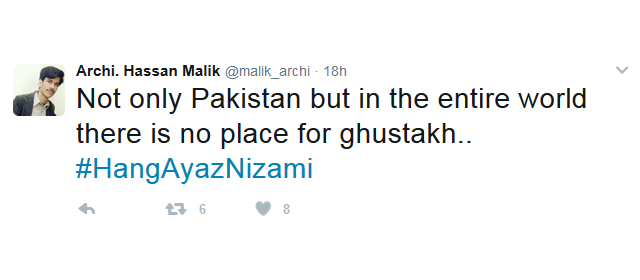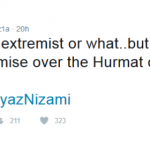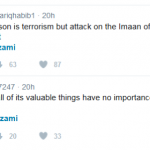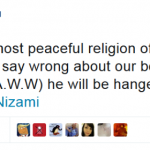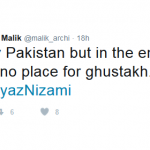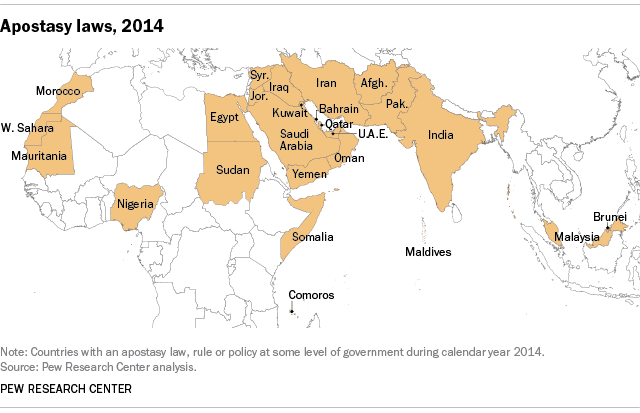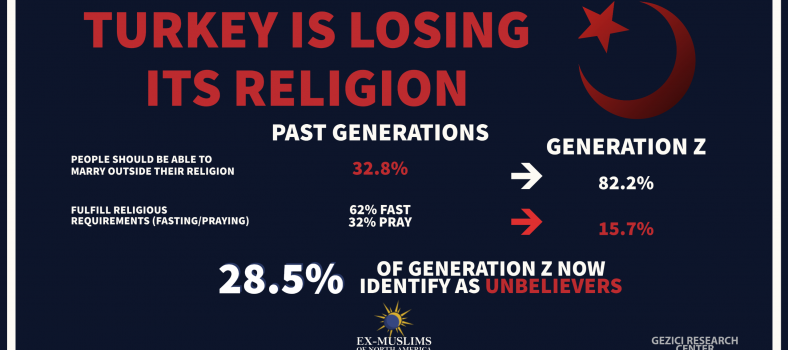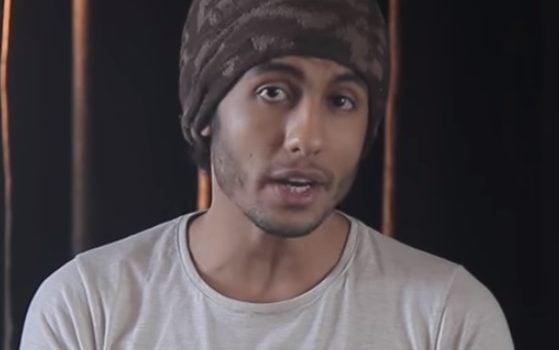Voices of moderation and #HangAyazNizami
Despite reams of evidence, it is difficult for the average Westerner to comprehend the state of religious fundamentalism in Muslim countries. The truth is savage and unyielding – and we have no chance of changing reality if we refuse to even face it.
Here is the face of religious “moderation” in Islamic countries – Pakistanis are demanding the murder of an atheist #HangAyazNizami who committed the “crime” of organizing an atheist group online and post about his disagreements with Islamic doctrine.
Multitudes are calling for the hanging of Ayaz Nizami for blasphemy – not only the mullahs, but the average man and woman. This is the country in which tens of thousands rallied to honor and mourn the killer of a governor who defended a Christian – fundamentalism is the norm.
Ayaz is not the first to face this cruelty under the cloak of religious piety, nor will he be the last. In fact, hostilities against atheists and blasphemers have intensified in Pakistan.
Since the start of 2017, the government of Pakistan has arrested or abducted multiple writers and activists. Five of such activists were tried for blasphemy following a charge by Salman Shahid, the son-in-law of Abdul Aziz, a cleric known for his support of ISIS and Al-Qaeda.
The trial of the five men devolved into a modern day inquisition. The judge, Justice Shaukat Aziz Siddiqui, called for widening the charge of blasphemy to all those who speak against the Prophet Muhammad, stating that social media posts critical of Islam and the Prophet are worse than terrorism. The Prime Minister of Pakistan and the parliament endorsed the calls directing the nation’s intelligence services and social media companies to root out critics of Islam.
In a move reminiscent of the Stasi, the government has sought to recruit average citizens in their efforts to root out atheists, placing ads to encourage reporting as well as reminding readers of the consequences of blasphemy.
Pakistan is not alone in its persecution of those that do not toe the line of religious sensibilities. A majority of Muslim countries persecute those that abandon Islam, dare to speak up against the religion or advocate for a separation of mosque and state.
Raif Badawi, a Saudi secularist has already served five out of a ten-year jail sentence for insulting Islam. In Bangladesh, murders of bloggers have occurred with alarming frequency. In response, the Bangladeshi prime minister has blamed the victims for writing “filthy words” against religion and the home minister calling for the investigation of the writings of the slain in order to see whether they have “written anything objectionable”. In Iran a young man of 21 Sina Dehghan has been sentenced to death for blasphemy, his appeal recently denied by a high court.
Muslim groups are also advocating for the policing of blasphemy within non-Muslim countries. The Organization of Islamic Cooperation, an organization that includes 57 Muslim majority countries, spent over a decade lobbying the UN Human Rights Commission against the “defamation of religion”, in the hopes of internationalizing blasphemy laws. In 2011 with the support of the United States, the UN General Assembly adopted a version of a resolution that calls on states to adopt “measures to criminalize incitement to imminent violence based on religion or belief.”
According to Jonathan Turley of George Washington University “The OIC has hit on a winning strategy to get Western countries to break away from their commitment to free speech by repackaging blasphemy as hate speech and free speech as the manifestation of “intolerance.”
Naturally, Pakistan is working to expand its current war against freethought by enlisting other Muslim countries. This week, it hosted representatives from most Muslim countries with the aim to coordinate a concerted effort to clamp down on dissent. The participating countries agreed to pressure international organizations in service of their goals.
This war on dissenters is nothing new, however. In Pakistan, the persecution and murder for the crime of offending religious sensibilities is something of a national tradition. Even the founder of Pakistan, Mohammad Ali Jinnah, once participated in the defense council of a young Indian man who murdered a publisher for printing a book (Rangila Rasool) which mocked the Prophet Muhammad. Fundamentalism in the supposed ‘land of the pure’ is not a fringe phenomenon, but ingrained deep in the hearts and minds of its citizens.
Meanwhile, the most esteemed Islamic university in the world, Al-Azhar University in Egypt, continues to advocate for the death penalty for Ex-Muslims.
These centuries old traditions of persecuting and murdering dissenters and reformists continues unabated while the absence of secular partners in the Muslim world is lamented. How could such partners exist or gain strength when the violence against us has been so chillingly effective and the silence of our erstwhile allies remains deafening.
Despite that, Ex-Muslims around the world are finding their voice for the first time and speaking up ever more confidently. There are underground or public Ex-Muslims organizing in every Muslim country or community and we do not intend to retreat from the challenge before us. The choice for the rest of humanity is whether the burden to achieve a positive future is borne by the persecuted alone or shared by all.

